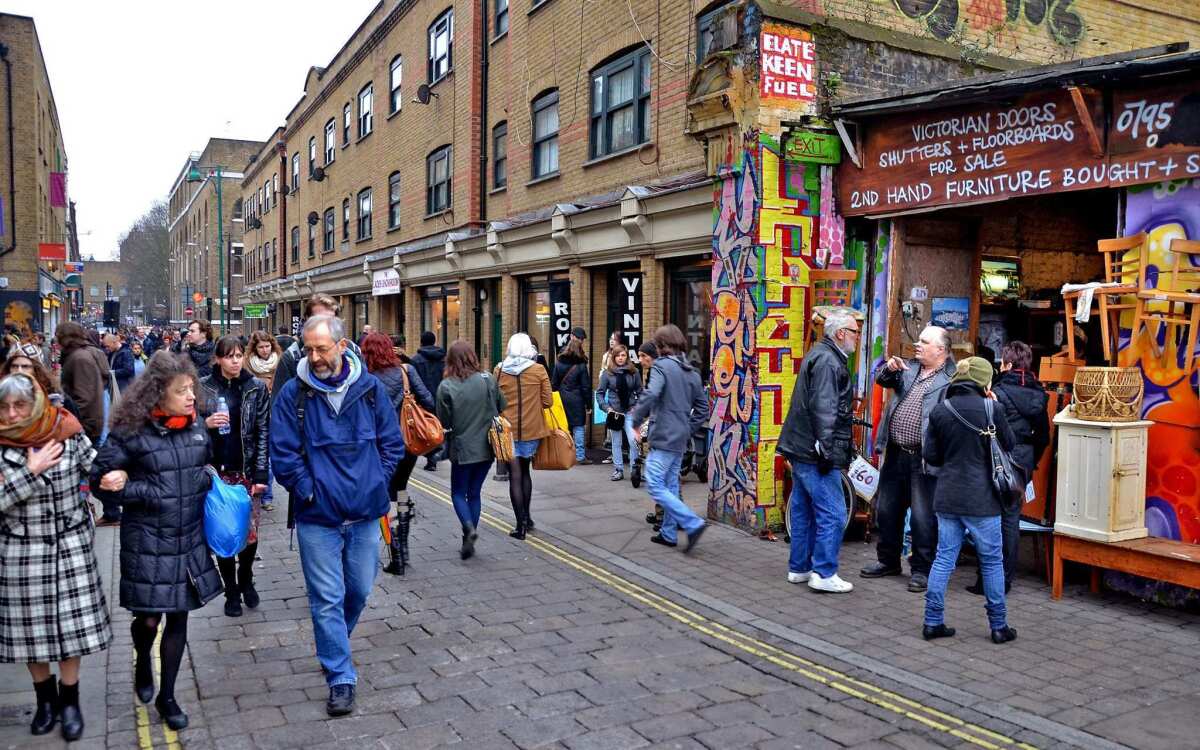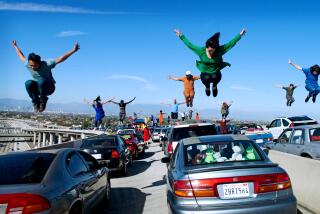London’s East End, an Olympics alternative

Reporting from London — Never mind the sprints, relays and marathons coming to London this summer. Look at the competition now among the flower vendors of Columbia Road.
“Who’s got a fiver?” hollers one grizzled man with a fistful of roses.
“Four for 2 quid!” bellows another.
“Five pounds a bunch!” howls yet another.
These guys sound better than the extras in “My Fair Lady,” and they’re here every Sunday morning at Columbia and Ravenscroft streets, supplying blooms, succulents and a soundtrack to accompany London’s ascendant East End, which is soon to be neighbored, sort of, by the Olympics.
What if you dodged the July 27-Aug. 12 Games but hit London and the East End? The cultural and infrastructural benefits that come with the Olympics have already begun and will last long after the last shot is put. New train stations opened last year in East London’s Hoxton and Shoreditch High Street. Two thousand rental bicycles will be added to East End neighborhoods by 2012 as part of a Barclay’s campaign to make blue bikes as common in London as red buses and black cabs. And a new exhibition of landscapes by David Hockney will take place Jan. 21-April 9 at the Royal Academy of Art, which isn’t in the East End, but maybe a new train could take you there.
Even without such bonuses, the East End is an increasingly interesting place to be. On a visit to London early this year, I spent most of my time in the East End neighborhoods of Shoreditch, Hoxton, Spitalfields and Brick Lane that lie roughly midway between central London and the new Olympic Park, eight miles east at Stratford.
You can begin with a stroll to St. Paul’s Cathedral, whose dome has served as the city’s bowler hat since the 17th century. Nearby stands the Museum of London (150 London Wall, https://www.museumoflondon.org.uk), which from Dec. 9 through June 10, will offer a major “Dickens and London” exhibition on the 200th anniversary of the author’s birth.
You’ll also be handy to the City, where London’s financial titans ply their trades, and Clerkenwell, the neighboring area where many a pound is spent in design shops, restaurants and the often-jammed Fabric nightclub (77a Charterhouse St.).
My home base was the Hoxton hotel, which opened in 2006 near the Old Street tube station in Shoreditch. Accouterments include industrial-chic concrete floors, naked ductwork and the popular Hoxton Grill restaurant; desk clerks are outfitted with Champagne and candy bars to sell between handing out key cards. The Guardian and Observer newspapers’ 2011 readers’ poll named the Hoxton “best U.K. hotel.”
Close at hand, a visitor can go clubbing on Curtain Road, browse contemporary art at White Cube Hoxton Square or cross the Thames by foot on the sleek and tempting Millennium Bridge. That will put you face to face with the Tate Modern, a vast former power station that has been reborn as a home for art made since 1900. It’s spectacular. It’s free. Do it. And as you cross back over, picture a little East End history.
This once was a grimy industrial zone where factories brewed ale and belched smoke, where 17th century French Huguenot immigrants were followed by 19th century Irishmen and Jews from throughout Europe, who were followed by 20th century Bengali immigrants, whose curry shops remain.
The East End wasn’t just poor and dangerous in the bad old days; it was inspirationally poor and dangerous. Ikey Solomon, the 19th century criminal who inspired Charles Dickens’ Fagin, had his shop here on Bell Lane. The unfortunate Joseph Merrick was displayed as the Elephant Man on Whitechapel Road and died after years in residence at the London Hospital on the same thoroughfare. Jack the Ripper stalked victims here and is said to have patronized the Ten Bells pub, still in business at 84 Commercial St. opposite the Old Spitalfields Market.
Then in the 1990s, artists and galleries began moving in, followed by nightclubs, restaurants, shops and lodgings. Some parts of the East End remain grim. But the riots in August, which hit hard in areas such as Clapham and Tottenham, brought little trouble here.
One part of the new prosperity is the Old Spitalfields Market. The enterprise dates to the late 1600s, and many of the buildings are from the Victorian era, but the market got a dramatic redevelopment in 2005 that brought in several sleek buildings (and, some would say, chased away some charm). On Sundays, you can browse arts, crafts, Kate Moss T-shirts, fancy soaps that look like dessert and fancy desserts that look like soap.
The best meal of my visit was across the street from the market at St. John Bread & Wine (94-96 Commercial St.), which opened in 2003 as a more casual offshoot of the Michelin-star-winning St. John restaurant in nearby Smithfield. Both St. Johns revere “the whole beast” and load their menus with offal and cuts of meat seldom seen anywhere else. I ordered the deviled sprats — just because it sounded good — and soon confronted a plateful of 6-inch fish, heads and skins attached, all so tender and savory that it was a joy to swallow their bodies, bones and all.
From Spitalfields and Commercial Street, it’s an easy walk to Brick Lane. The long, narrow lane was home to Bangladeshi immigrants and curry houses for much of the 20th century, but young artists, fashion mavens, nightclubs and artisans’ markets have livened up venues such as the Old Truman Brewery complex (10 acres), and Sundays are a party here.
“I wrote my dissertation here,” Rachel Bramwell told me, looking in as we passed Café 1001 Coffee Shop and DJ Bar in the Truman complex. Bramwell, who grew up in the Silver Lake neighborhood of Los Angeles, moved to London a few years ago for graduate study at the London School of Economics. Then she landed a job. So now the former L.A. Eastsider is an East Londoner, unfazed by daily adventures among hipsters, slackers, starving artists and underdressed professionals.
About five blocks west of Brick Lane in Shoreditch, Bramwell steered me to Boundary and Redchurch streets for a look at No. 2-4 Boundary. That’s where British design star Terence Conran — who has called Shoreditch “London’s new Soho” — joined with collaborators Vicki Conran and Peter Prescott in 2009 to open a striking food-and-lodging project. On the ground floor, the casual Albion Cafe and market were packed with lunchtime diners. Just upstairs lay the stylish Boundary Rooms hotel (12 rooms and five suites, each done in the style of a different modern or contemporary designer). On the top level, the Boundary Rooftop, a 48-seat bar, grill and garden was awaiting better weather. Meanwhile, in an enormous space below ground level, the fancier Boundary Restaurant was offering French cuisine.
The café looked like a great lunch spot, but it was so jammed that we wound up instead at the nearby Owl & Pussycat, a watering hole that was reborn as a gastropub in 2010. It was more affordable and still tasty.
After picking up some blooms at the Columbia Road Flower Market, Bramwell pointed out the Victorian storefronts that now specialize in upscale gardening accessories, neighbored by pubs and restaurants. A short walk away, families were admiring the chickens, bunnies and pigs at the Hackney City Farm, a nonprofit enterprise that promotes urban farming, gardening and low-impact living.
Later in my stay, as I meandered along Coronet Street near Hoxton Square, I glanced in an oddly lighted shop window and noticed a pair of women on a pair of narrow beams, each tiptoeing and resolute, arms aloft to maintain balance. Then I checked the shop name: Circus Space. It was a gymnastics class. And if that’s as close to the 2012 Olympics as I get, that will be fine.
More to Read
Sign up for The Wild
We’ll help you find the best places to hike, bike and run, as well as the perfect silent spots for meditation and yoga.
You may occasionally receive promotional content from the Los Angeles Times.







